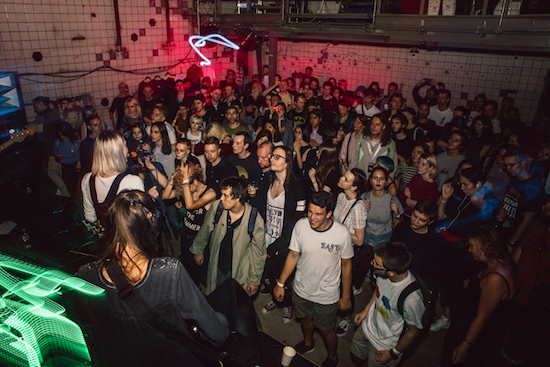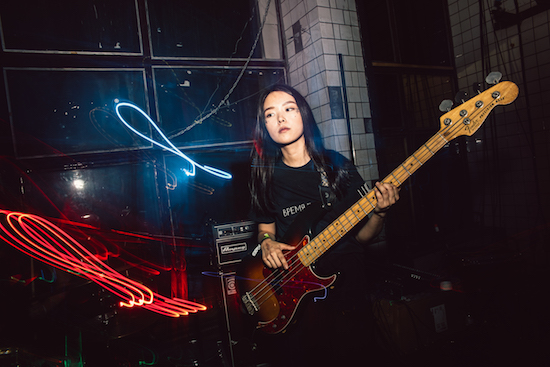At night, the outskirts of Moscow are lit up by an intense green and red neon. Being driven through the city at 4am for Moscow Music Week which began later that day, the sheer scale of the Moscow skyline momentarily came into perspective when a huge thunderclap fills the horizon with sheets of lightning. It’s a huge city, almost the size of New York and about 1.5 times bigger than London. On my journey into the centre of Moscow from the airport, I also notice a few limited yet surreal parallels with London – an Ikea with a Cyrillic logo, or a lonely-looking McDonald’s. Upon arrival, I have a mere couple of hours to get my bearings before I join the rest of the UK press on a trip to a design and architecture complex on the outskirts named ARTPLAY. It’s an area that feels more European than anywhere else I visit in Moscow, situated in a converted tea factory that reminded me particularly of Shoreditch or Brick Lane in London. Some Moscovites I met use the word ‘hipster’ to describe this stylised, art college-associated, gentrified and self-contained area of their city – except of course, unlike London, the space they have access to is enviously bloody huge in comparison.
In the ARTPLAY design centre itself we became part of a conference with Russian promoters on whether mass media played a role in helping artists to become successful. The discussion eventually lands on the subject of Boiler Room and the Moscow DJ and ‘beats’ scene. Russian promoters and labels are now paying attention to Boiler Room exporting DJs like Nina Kravitz back to the UK, but there’s a worry here from the panel that perhaps these artists are marketed as “exotic”. As I later gathered from Moscow Music Week – an incredibly broad music festival that somehow manages to pull together and showcase scenes throughout the country – Russia has more to offer than simply its dance music.
What’s also perhaps obstructing Russian bands from being “exported” easily to the UK is the fact that they are staunchly committed to singing in their own language – and fair enough – they’re not looking to make their music more commercial abroad in the obvious sense of making it more accessible through adopting a European ‘lingua franca’. But even still, there’s a lot of reliance from outside press in order to spread the word regarding Russian bands which, as we quickly we find out, is why we’re here. The first interest in Russian music came from German journalists in the 1980s, and more recently from former Soviet countries with big Russian speaking populations like Estonia – as well as countries which have historically served as a touring crossroads for bands such as The Netherlands – with their promoters often fitting Slavic artists together onto the same billing.
Being a British visitor to what is a labyrinthine city only a fraction smaller than New York, it was easy to find yourself drawn to hanging around places like ARTPLAY as they had a selection of shops and cafes that were homogeneous with those you could find in London or any major European city. But you’d be missing out on, well, Moscow. Or at least several of its layers. The venues at Moscow Music Week presented a more complex, furious, weird, unclean and at times even unnerving side of the city. Unlike ARTPLAY, small clubs like Pluton or Dom or Aglomerat lacked a distinct ‘branding’ (excuse me for using this word) often remained almost unchanged from the disused warehouses and factories from which they were converted.
With an entrance only locatable by its large outdoors smoking area, Pluton resembled a stylised but hidden European club inside what looked like a converted power plant. By the looks of things it hadn’t undergone any refurbishment other than the installation of some red neon lights (Moscow is cluttered with neon in all shapes), a bar and a stage in one of its two rooms. At the bar they serve us tiny cups of vodka shots with a slice of lemon on the side. When it comes to post-punk influenced guitar bands, Britain might be suffering from an Interpol hangover but Russian bands don’t seem to have that same lack of imagination, as was seen from Friday’s ‘Sputnik Stage’ lineup. One band Lucidvox displayed this totally, featuring a flautist and vocalist who could create steady, cold streams of sound with her voice – powerful though balanced with a touch of fear. Lucidvox knew how to take over an entire room with their presence, with long heavy stoner-y jams that recall 80s European bands like Xmal Deutschland or early Cocteau Twins.
They’re followed with Inturist who are perhaps one of the most immediate and dynamic acts at Moscow Music Week, sounding at times like a Moscovite Talking Heads or channelling less melodic New York no wave bands like DNA or James White. It was as if they took a similar ethos to those of these bands – i.e. hijacking a conventional guitar band sound with non-western rhythms – and interpreted this via Russian folk traditions. I like bands that occasionally make themselves difficult to dance to, and Inturist often made the audience stop/start, in a constant process of interpreting beats through the body. As an added bonus, their saxophonist looked like he should have been playing some MOR jazz but instead was at points intersecting the two guitarists with well timed, almost aggressive squealing. It was saxophone as blunt musical object, and it worked completely with the set.

I’m told that there’s real sincerity to the lyrics of the Ekaterinburg band Die Konfekte, a gabber-influenced duo who sing about lucid dreaming and pink flamingos – it’s no joke, apparently. There’s a heaving mosh-pit for this duo, and at one point I was sent flying out of nowhere despite standing innocently to one side. A Russian journalist on a VK.com blog wrote about the same moshing experience: “My shoulders are not mine! Now they are charged with power!” Mine, it seems, were absolutely not at all. So it’d be an understatement to say that there was a huge energy in the room, and although it’s strongly encouraged by drinking, it felt at times purposeful, as if fuelled by real frustration. Die Konfekte are regulars at a club called Ionoteca in St Petersburg, which has a large LGBTQ crowd that sometimes includes transgender children. They were the real standout group at the stage on the first day where we saw the St Petersburg-centric bands who played at this venue, and who are all apparently quite well known in the city. This all took place in what looked like a long abandoned office block or school. I have literally no idea where we were at this point, and I still don’t. None of these ‘venues’ felt particularly official, but that’s definitely part of what was exciting and intriguing and mysterious about them.
At nightclub Aglomerat (aptly translatable into English as ‘crowded’), Moscow band Glintshake are no strangers to dissonance, which the audience embraced with just as much energy as the more melodic, Swim Deep-esque bands that played before them. On this Saturday performance, they share a guitarist with Inturist and are fronted by the overwhelmingly intense Kate Shilonosova, whose electronic solo project Katya NV was signed recently to label RVNG Intl. Their singer would feverishly jolt about and gave us a good thousand-yard stare as if channelling the spirit of a young David Byrne during his Stop Making Sense performance, or X-Ray Spex’s Poly Styrene. Her exaggerated, awkward bursts of movement were mesmerising. With little regard to safety or self-consciousness, audiences would leap at the stage with fervour and excitement, but it was during Glintshake’s set where they seemed to be more curious – they’re the kind of band you find yourself being lost in not through dancing but rather by making you stand still in your tracks.
Pluton’s second room was opened up on the following day, and to reach it you had to walk through what looked like sheets of PVC strip curtains you’d find hanging in a butcher’s to keep out flies. It was undeniably a macabre atmosphere for a music venue, but the noise sets that were on that day were more than tolerable. Russia is one of electronic music’s places of birth, with engineer and Soviet tech lab worker Lev Thermen having invented the Termenvox aka the theremin in 1919. This past is alluded to in Pluton’s second night running, with awe-inspiring sets including ones from Siberian sound artist Dmitri Mazurov, and Mi Croevkhas with his modular-generated noise. Croevkhas’ set was never shrill enough to the point that it was painful to listen to; instead weaving its way into the room as a warm, but energetic frequency. Forgetting the fairly grim PVC curtains you could have convinced me at that point that we were in some kind of gently vibrating metal womb, and I even almost fell asleep in one of Pluton’s leather chairs before being ushered off to another venue.
It’s at Dom that the free jazz showcase took place across two days including Sanscreed Kanon and Solo Operator. Kubikmaggi are particularly ferocious, with vocalist Kseny Fedorova snarling and snapping Maja Ratkje-like through the band’s progressive jazz pluckings and squawkings. The young audience hanging around by the bar were completely unfazed by this music that was leaning headfirst into chaos. I’m not sure how they manage to take it all in – it was probably some of the most intense experiences on offer at Moscow Music Week.

By the third day of hanging round Moscow bars and clubs, our paranoia dials were cranked up to 11 and threatening to climb higher. It’s a city-as-fairytale: expect to cross paths with black cats, butterflies, people dancing in the road between oncoming cars or clasping giant bouquets of flowers draped over their shoulders and countless, almost identical back alleys. After having accidentally wandered straight through an extravagant bar with a vodka bath at its centre, we managed to find the famed spot Patriarch’s Ponds, associated with the writer Mikhail Bulgakov and a place he refers to in his novel The Master and Margarita. There was something sinister or uncanny lurking beneath the park’s peacefulness, where there’s a statue of Bulgakov sitting hunched in a huge chair and totem-like metal statues in a row beside him depicting stories from a Russian fable.
We were also swept off to one of Moscow’s ‘poet bars’, which was where were were told, students tended to drink. It was at this point that we had the vague sense that we were being watched or followed – but by who or why it wasn’t clear, and it certainly wasn’t by the photographs of Morrissey and Marr that were looking down at us from the wall near our table. According to an observant acquaintance it seemed like wherever we went that evening, there was a man with us who seemed to know exactly which venue we would pop up at next, and – the ultimate giveaway – he was wearing a T-shirt that in Russian read: “You can run, but you can’t hide”. I truly wanted to be afraid of this man, who was in retrospect probably a threat to my safety, but the hilarity of his ridiculous top just overrode any natural sense of self-preservation.
This hilarity lasted about five minutes before the entrance of a new antagonist, a woman in a beige anorak who joined us in the taxi ride to the poet bar. She confirmed that the man in the T-shirt had indeed been following us around, before asking me for my Facebook or email address. I decide that “Maybe tomorrow!” is enough of a reply but a heavy, borderline evil-feeling silence afflicted us for the journey’s tail-end, as she realised that I might have guessed her motives. Everyone else in the taxi, it turned out, also had the same realisation. I really wanted to ask her, though: are music journalists really a top priority for fascist groups in Russia? Is this all happening because I once went to a jumble sale at an anarchist club in Brighton, and someone’s got it on record? But perhaps I had asked too many questions already.
By this point I’d slept maybe six hours during the whole of the festival, so maybe my sleep deprived brain somehow constructed this thriller-like finale to the trip. “Moscow does not exist!” some of its residents would joke to us – and by the end it wasn’t always obvious what was fact and what was just a fanciful fiction, the result of being transported to a place which felt like a complex puzzle, a place with an impenetrable social logic to me as a Brit.
On the whole it seems like Russia’s many disparate underground music scenes – all reasonably interconnected despite being the world’s largest country – have for a long time been open to Europe, and this is only growing with the aid of the Internet. Though particularly for those living in former Eastern Bloc countries, who have been experiencing Russian music for far longer than the UK has, and have moved beyond the label of Eastern Europe. There’s certainly more to Moscow than its DJ scene, with its post-punk, noise, rock and free jazz artists all enlivening the city and beyond with sounds that despite being dissimilar in terms of genre have a collective sense of explosiveness and urgency. If you just focus in on the electronic and DJ scene and nothing else, there’s a risk of losing out on a far more rich music scene in Moscow if you don’t keep yourself open to what’s just down that shady-looking alley, though of course, while looking over your shoulder at times if you choose to do so.


